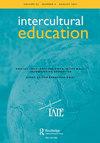全球公民框架下的跨文化交流洞察:韩国大学生之声
IF 0.8
Q3 EDUCATION & EDUCATIONAL RESEARCH
引用次数: 2
摘要
摘要本研究旨在探讨韩国大学生对跨文化交际重要性的看法。它还寻求获得与会者关于如何在个人生活、校园和社会中提高对跨文化交际的认识的建议。跨文化交际能力正变得越来越重要,因为世界变得更加相互联系在网上,并通过发生在各种能力的跨文化交流。这项研究于2020年春季学期在韩国中部的一所大学进行。参与者包括14名韩国大学生,他们参加了一门为英语学习者设计的在线跨文化交流课程。数据包括个人访谈、焦点小组和论文。数据分析的重点是审查与会者的共同点和主要发言。就为什么研究跨文化交际很重要而言,结果强调了人们需要理解和了解不同的文化,尊重其他人和文化,并确保过去的跨文化冲突不会在未来发生。学生们就如何提高跨文化交际意识提出了广泛的建议。本文的结论具有实际意义。本文章由计算机程序翻译,如有差异,请以英文原文为准。
Insights into intercultural communication from a global citizenship framework: Voices of South Korean university students
ABSTRACT The aim of this phenomenological study was to explore South Korean university students’ views of the importance of intercultural communication. It also sought to obtain participant recommendations on how to improve awareness of intercultural communication in their personal lives, on campus, and in society. Intercultural communicative competence is becoming increasingly important as the world becomes more interconnected online and through intercultural exchanges that take place in a variety of capacities. This study was conducted during the spring semester of 2020 at a university in central South Korea. Participants included 14 South Korean university students who were enrolled in an intercultural communication class that was conducted online and designed for English language learners. Data comprised individual interviews, a focus group, and essays. Data analysis centred on examining commonalities and key statements made by participants. In terms of why it is important to study intercultural communication, results highlighted the need for people to be understanding and knowledgeable about diverse cultures, have respect for other people and cultures, and ensure that past intercultural conflict does not happen in the future. Students provided a wide range of recommendations for improving their awareness of intercultural communication. This paper concludes with practical implications.
求助全文
通过发布文献求助,成功后即可免费获取论文全文。
去求助
来源期刊

Intercultural Education
EDUCATION & EDUCATIONAL RESEARCH-
CiteScore
2.30
自引率
8.30%
发文量
36
期刊介绍:
Intercultural Education is a global forum for the analysis of issues dealing with education in plural societies. It provides educational professionals with the knowledge and information that can assist them in contributing to the critical analysis and the implementation of intercultural education. Topics covered include: terminological issues, education and multicultural society today, intercultural communication, human rights and anti-racist education, pluralism and diversity in a democratic frame work, pluralism in post-communist and in post-colonial countries, migration and indigenous minority issues, refugee issues, language policy issues, curriculum and classroom organisation, and school development.
 求助内容:
求助内容: 应助结果提醒方式:
应助结果提醒方式:


